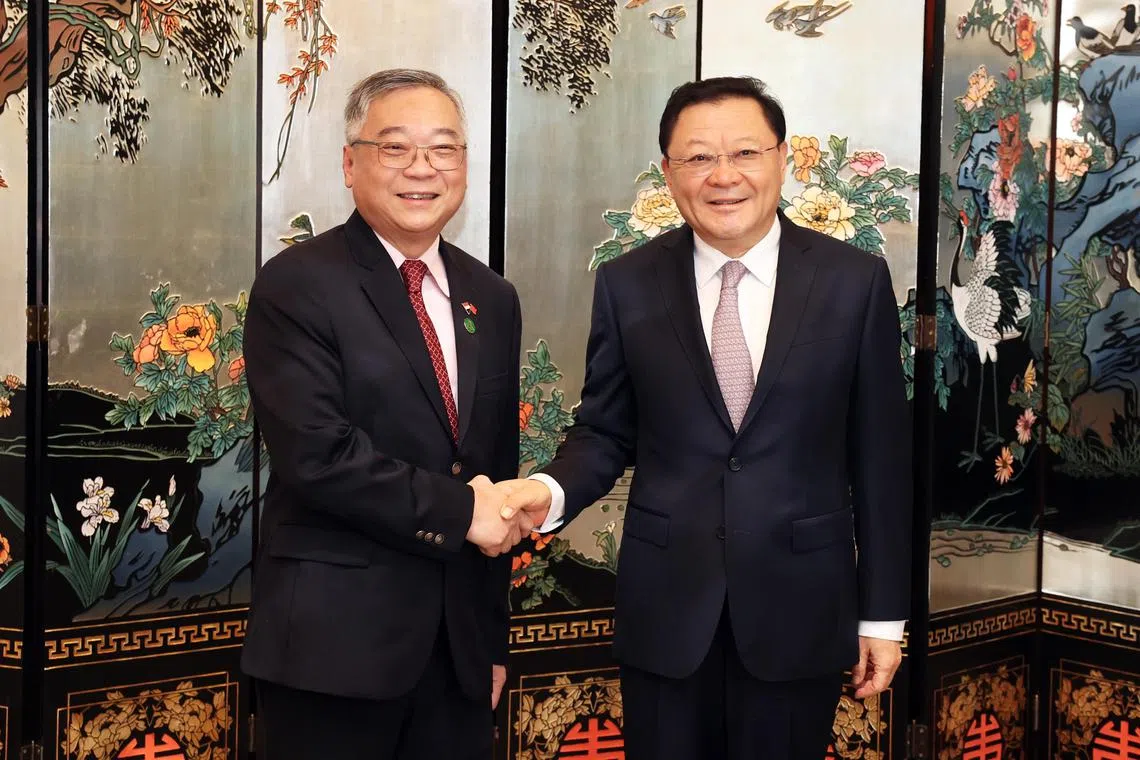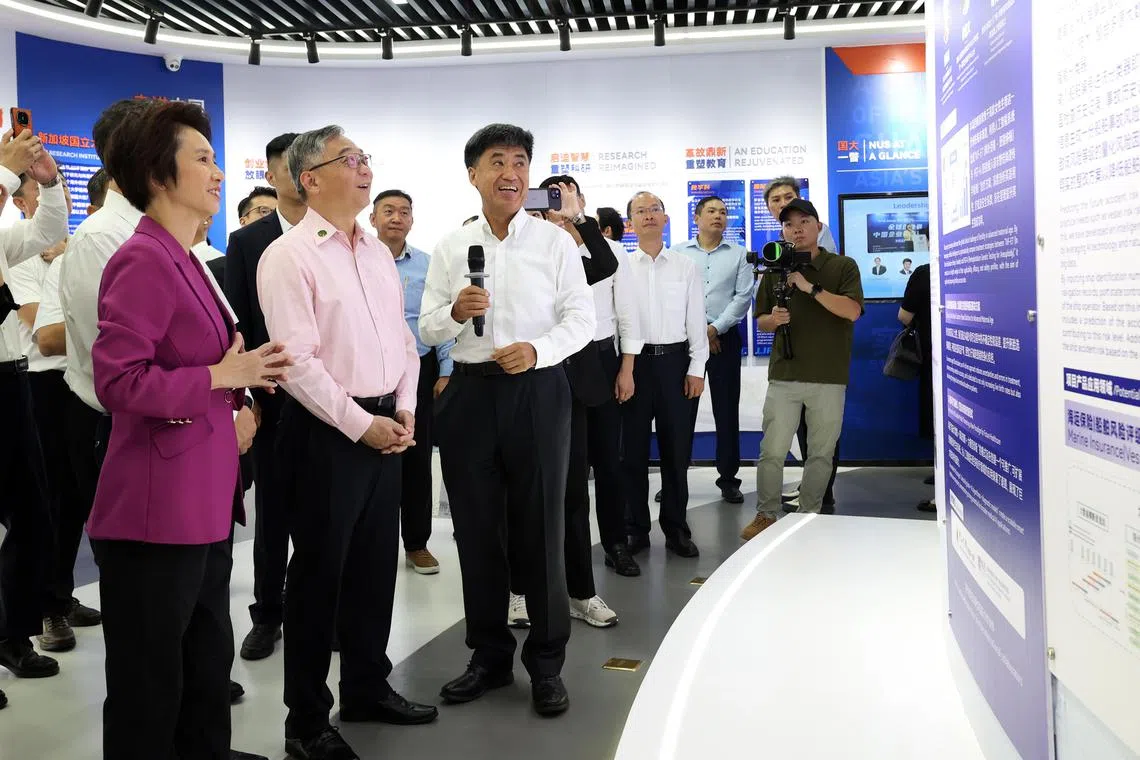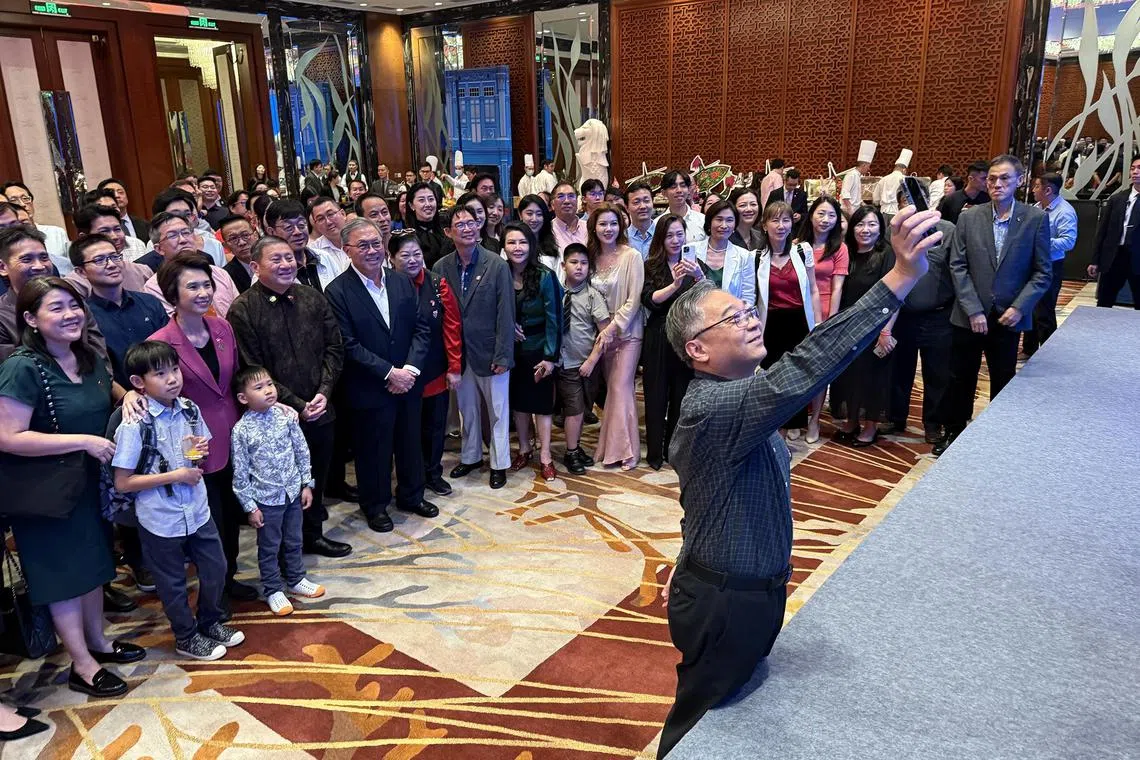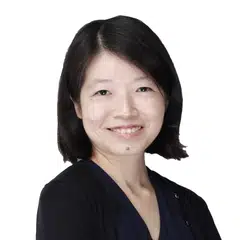Key for countries to work together to seize opportunities amid tariff uncertainty: DPM Gan in China
Sign up now: Get insights on Asia's fast-moving developments

Deputy Prime Minister Gan Kim Yong (left) meeting Guangdong Governor Wang Weizhong in Guangzhou on Sept 1.
PHOTO: MDDI
GUANGZHOU/SHENZHEN – The emerging framework of trade tariffs presents not just challenges but also opportunities, making it important for countries to work together to seize these opportunities, said Deputy Prime Minister Gan Kim Yong in Guangzhou on Sept 1.
The global economy will undergo significant restructuring and shifts, supply chains will be reorganised, and all countries will be impacted by the new system of tariffs in the near term, DPM Gan said at a meeting with Guangdong Governor Wang Weizhong.
“But (when) we take a longer-term view, I think there will always be opportunities for us, and it is important for us to work together to seize these opportunities,” he added.
DPM Gan was referring to the series of tariffs unleashed by US President Donald Trump
The Deputy Prime Minister, who is also the Republic’s Minister for Trade and Industry, is on a five-day working visit to China, which began in the southern trade and manufacturing hub of Guangdong. The trip will culminate in Beijing, where he will attend a parade on Sept 3 marking the end of World War II
On Sept 1, Mr Wang met and hosted DPM Gan to lunch. They reaffirmed the strong economic collaboration and longstanding people-to-people ties between Singapore and Guangdong, Singapore’s Ministry of Foreign Affairs (MFA) said in a statement.
They also agreed that the China-Singapore Guangzhou Knowledge City (CSGKC), a bilateral project in its 15th year, would continue to be a useful test bed for the development of new technologies and support knowledge sharing between both regions, MFA added.
Guangdong is China’s largest provincial economy, and a powerhouse of high-tech industries such as robotics, electric vehicles and information technology. It has been the Republic’s top provincial trading partner in China for the last 36 consecutive years.
Mr Wang said Guangdong’s total trade growth in 2025 had slowed due to the US tariffs, but pointed to new growth engines such as industrial robots and advancements in future industries such as AI-powered robots.
He also spoke of strengthening cooperation with Singapore, including in areas like artificial intelligence (AI), robotics and pharmaceuticals, and through the CSGKC, which began in 2010 as a private sector-led effort to develop high-tech industries integrated with residential, commercial and recreational developments.
The township, spanning 232 sq km about an hour north of Guangzhou’s city centre, has attracted investments from more than 100 Singapore companies to the tune of 18.5 billion yuan (S$3.3 billion), according to figures cited by Mr Wang.
While at the township, DPM Gan visited the NUS Guangzhou Research Translation and Innovation Institute, DBS Technology China, and agritech start-up Singrow.
DBS Technology China was launched at the CSGKC in August 2024 as DBS Bank’s third global technology hub after Singapore and Hyderabad. It develops fintech software that the bank can deploy in markets across the globe.
The Republic’s largest bank chose this site because “lots of young and technical talent” are in the Greater Bay Area, said Mr Kevin Yang, chief executive of the bank’s entity in the township. The office currently has about 600 staff, he added.
DPM Gan urged the bank to conduct exchanges for some of its Chinese staff to visit Singapore to learn about how the Republic develops software, and vice versa. “The approach is different, I think there’s value in cross-learning, at different levels,” he said.
Singrow, which develops indoor vertical farming technologies, now has a full suite of facilities, including a molecular breeding lab and a smart seedling factory, two years after it landed in the CSGKC in 2023
It sells the strawberries it grows in Guangzhou locally and exports to countries like Singapore, Thailand and Indonesia, said Dr Bao Shengjie, the start-up’s founder. The CSGKC, he added, “enabled us to leverage bilateral resources – combining Singapore’s R&D strengths with China’s manufacturing and market scale – to accelerate our commercialisation and regional expansion”.
Established in March 2024, the NUS facility in Guangzhou is the Singapore flagship university’s fourth research institute in China and serves to translate basic research into real-world applications, incubate start-ups and provide support for Singapore companies looking to enter the Greater Bay Area.

DPM Gan Kim Yong (second from left), accompanied by Senior Minister of State for Trade and Industry Low Yen Ling (far left), visiting the China-Singapore Guangzhou Knowledge City on Sept 1.
PHOTO: MDDI
Meeting Singaporeans
Later in the day, DPM Gan travelled to Shenzhen, where he attended an evening reception with overseas Singaporeans at the Shangri-La Hotel in Futian, the city’s financial district.
“It is in this time of uncertainty that we need to continue to strengthen our partnerships,” he said in his opening remarks, thanking the crowd of about 170 for flying the Singapore flag in China.
The event buzzed with chatter in Singlish as Singaporeans based in Guangdong were treated to local delights that included curry puffs, kueh pie tee and ice-cream sandwiches.

DPM Gan Kim Yong at an evening reception with overseas Singaporeans on Sept 1.
ST PHOTO: JOYCE ZK LIM
Ms Adeline Teng, a Guangzhou-based educator, decided to make the two-hour trip to Shenzhen with two colleagues because “it’s DPM! It’s our honour to meet him in person”.
“I also miss Singapore, so mingling with Singaporeans helps,” she added.

Guangzhou-based educator Adeline Teng with her colleagues at the Sept 1 evening reception for overseas Singaporeans.
ST PHOTO: JOYCE ZK LIM
Ms Teng relocated to China in January to lead the primary school at Guangzhou Singchin Academy. The school sits in the CSGKC and is affiliated with Singapore’s Hwa Chong family of schools.
Asked to name one thing that has surprised her about China, she cited the public’s willingness to constantly learn and apply new technologies.
“It’s really quite amazing. Do you know that the school actually does not have a general office? Everything is (done within) an app.”
Mr Adrian Cheong, who works in real estate and has been based in Beijing and Shenzhen for the last 21 years, decided to pop by the hotel after finishing work “just next door”.

Mr Adrian Cheong and his wife at the evening reception for overseas Singaporeans.
ST PHOTO: JOYCE ZK LIM
This was the third event for Singaporeans that the assistant director at Swire Properties had attended in the past two weeks. He was at two dinners celebrating Singapore’s 60th National Day.
“I love laksa. I just had a scoop of this laksa and I think it’s good,” he said.
That was all he had because he was busy chatting with other Singaporeans, but no matter. His wife would whip up local fare once every few days, he said.
“When we go back to Singapore, we always buy these pre-packed mixes like chilli crab and bak kut teh from FairPrice,” said Mr Cheong.
“So it’s not so much that I miss Singapore food, but I miss Singapore a lot.”



